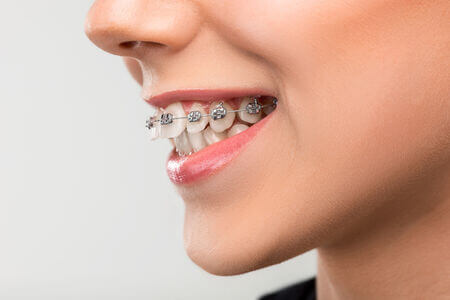Can orthodontists fix overbites?

A beautiful smile is magnetic. It boosts confidence and creates a positive first impression. If you’re unhappy with the appearance of your smile, it can be made over.
Misaligned and protruding teeth are common issues which can be corrected with orthodontic treatment.
What is an overbite?
Overbite occurs if the upper teeth do not align properly with the lower teeth. If your upper teeth protrude the lower teeth, that is a horizontal overbite.
A vertical overbite is when the upper teeth are positioned too far away from the lower teeth.
An overbite can be caused by various issues. It can be due to jaw size; overcrowding will occur if it’s too small to accommodate all the teeth. If there’s too much room available, there may be gaps between teeth.
Another possible cause of overbite is malformed jaw due to habits such as thumb-sucking or extended pacifier use. Biting nails and chewing on hard, inedible objects can also contribute to an overbite.
Premature tooth loss, teeth grinding, and genetics are also linked to overbite cases.
Overbite classes
Malocclusion or overbite has three classes.
- Class 1 Malocclusion. This is the most common type of overbite. It refers to cases where upper teeth overlap lower teeth, but the bite is still normal. The dental arches are aligned, but there may be other issues, such as crowding or gaps between teeth.
- Class 2 Malocclusion. In this overbite class, the front teeth are usually protruding or the lower jaw is undeveloped. Buck teeth cases fall in this class.
- Class 3 Malocclusion. This type of overbite involves cases where the lower jaw is significantly larger than the upper jaw. This makes the lower teeth more prominent than the upper teeth.
Can they be fixed?
Overbite issues can be fixed. The appropriate treatment differs depending on the type of malocclusion.
The earlier the bite gets corrected, the easier it is to achieve optimal results. A youth’s developing jaw is more flexible and responsive to corrections. However, adults also receive orthodontic treatments with very good results.
Your dentist may refer you to an orthodontist for treatment. In either case, they examine your mouth and customize a treatment plan for you. They also take X-rays of your mouth to determine the type of overbite you have. The treatment can last for up to two years.
How does an orthodontist fix an overbite?
Your orthodontist may recommend these treatment options in fixing overbite issues.
- Braces. Braces use metal brackets to put pressure on the teeth and move them to their proper position. How long you need to wear braces depends on the severity of your overbite and your commitment to your treatment. Once you complete the treatment, you may need to wear retainers to keep your teeth in their proper position.
- Aligners. For less severe overbite cases, your orthodontist may recommend using clear aligners or Invisalign. These clear aligners also correct teeth alignment, but unlike braces, they’re removable. Your food choices aren’t restricted as you can take out your aligners when eating.
- Surgery. In severe and rare overbite cases, surgery may be the ideal treatment option. If aligners or braces won’t address the issue, your jaw may need to be repositioned.
What happens if overbite isn’t fixed?
Left untreated, overbite can lead to severe health issues including jaw pain, sleep apnea, or speech difficulties. Early overbite treatment can improve your facial structure and restore your confidence.
If you’re from the Kitchener area and looking for a family orthodontist, we invite you to contact us whether you want to learn more about the condition of your teeth or available orthodontic treatments.
Our friendly team is happy to respond to your inquiries and assist you in booking a consultation at our Kitchener orthodontist office.
DGS powered by SmileShop


